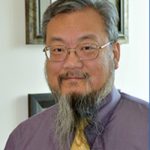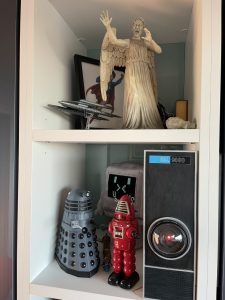David Lo
Advisory Committee Member, Center for Ideas and Society
 Department: Biomedical Sciences, School of Medicine
Department: Biomedical Sciences, School of Medicine
Rank: Distinguished Professor, and Senior Associate Dean of Research
# of years at UCR: 14
Top three texts I would take to a desert island: The Eighth Day of Creation, Horace Freeland Judson. (it’s a history of modern molecular biology); Joy of Cooking, Rombauer, Becker (enough said); A History of Western Philosophy, Bertrand Russell (it’s fun for triggering internal arguments with the book)
Favorite thing(s): Anything SciFi/ComicCon, and a well-stocked and equipped kitchen with lots of different spices and condiments!
Something people might be amazed to know about me…. I had a brief stint as a professional musician. I was a union card carrying violinist in the local symphony orchestra, and even played in the pit orchestra for Tony Orlando and Dawn. In medical school with a group of classmates, we started an orchestra and put on a few Broadway musical shows. But I decided that science held out a better long term career for me.
An “adventure” I am looking forward to, post-pandemic: Having a day out at a museum, including a nice quiet lunch
My theme song: Once in a lifetime (Talking Heads)
URLs to share: (https://mucosalvaccine.ucr.edu) (https://breathe.ucr.edu) (https://healthdisparities.ucr.edu)
Q: Your research agenda summed up in one sentence:
My main research interest has always been in how the immune system is regulated to produce responses to triggers such as vaccines or allergens, or how it may instead be convinced to produce no response at all.
Q: Broadly speaking, is there a central problem you are trying to solve?
My projects explore how immune regulatory pathways can be misled into developing patterns of responses that lead to chronic inflammatory diseases, such as Inflammatory Bowel Disease, or allergic asthma. For example in some of our work, we are looking at how environmental exposures may increase susceptibility to chronic inflammatory disease even in areas where man-made pollutants or toxins are relatively low. If we can figure out how these systems go awry, we might find more sophisticated or targeted approaches to clinical treatments instead of resorting to nonspecific immunosuppression.
Q: What are you working on currently?
We are working to solve the puzzle that living near the Salton Sea is associated with a high incidence of asthma. The Salton Sea is a drying salt lake, and a stressed ecosystem, so we are asking whether certain aerosol components produced by the sea cause lung responses triggering allergic responses and asthma. Alternatively, do these aerosols induce a different kind of disease that resembles asthma but has a rather different mechanism?
Q: What led you to a focus on health disparities in your research?
I came to this approach by an indirect path, where colleagues got me interested in the questions of health disparities and how air quality and health effects could be a particularly interesting health disparity research topic in smoggy Southern California. But I learned about the health disparities in Eastern Coachella Valley, that childhood asthma was unusually high among Latino families living near Salton Sea. Asthma is already an interesting but difficult immunology problem, but this also brought in the additional aspect of disparate impact on a specific community.
Q: What do you love about your work?
I enjoy solving difficult puzzles and discovering new biological mechanisms. I particularly enjoy finding problems that require an interdisciplinary approach that requires a diverse team of researchers. Our asthma project has been a great example of an interdisciplinary team, because we’ve engaged in a partnership with affected families to learn from them about the illness, collaborated with climate scientists to understand how seasonal winds affect the residents’ exposures to dusts from different origins, worked with environmental microbiologists to study the aerosols in the region, and worked with engineers to build a novel experimental system to test the biological effects of aerosols.
Q; What would you change about the academy, if you could?
It would be to change the perverse incentives in the power structure that incentivizes selfish behavior and penalizes cooperation; it reinforces an environment where there is little interest in learning about other academic disciplines and cultures across campus. Yet we still call it a university!
Q: Is there a key resource you often encourage students to access?
Their professors. Students are not encouraged enough to engage with the faculty and simply sit down and have them tell stories about how they got to the university. Hearing all those stories from both sides can be just as valuable as formally organized career development and mentoring; my own career was shaped by a lot of these early conversations.
Q: What have you learned from the experience teaching?
That each individual has their own path to knowledge and understanding, and being trapped by teaching evaluations, or trying to bribe the students will only block you from finding that new unique path for the next student. It seems that those unique students are the most rewarding as a teacher.
Q: How are you maintaining a connection with students during the pandemic?
I set aside plenty of time for one-on-one discussions with those students who are committed to understanding; this can also help lead to customizing their path.
Q: What service do you wish UCR provided more of in the future?
Providing diverse and quality food options, especially permanent spots for food trucks! So much productivity, conversation and teaching happens when people eat enjoyable meals together!

